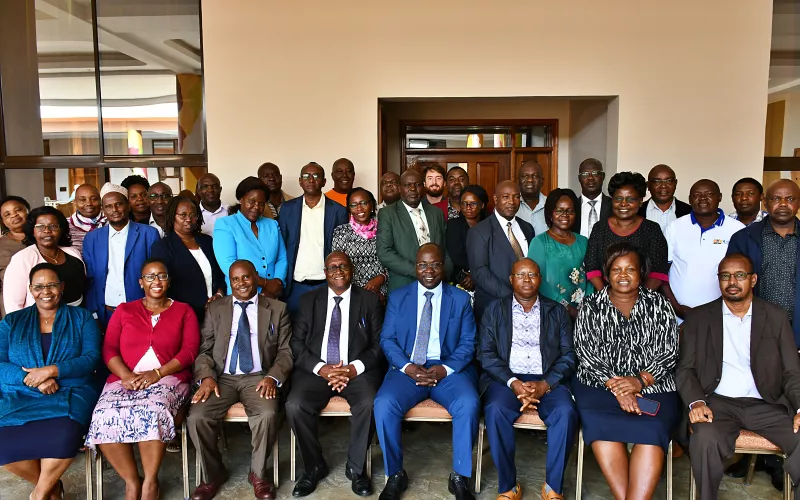Join our newsletter
By subscribing you agree to our Privacy Policy

County Leaders in the education sector have reaffirmed their commitment towards Implementing National Curriculum Reforms through app-based learning for School leaders in Secondary Education (INCREASE) and working in collaboration with all relevant partners and stakeholders to ensure that it is scaled across the country.
This was during the recent county leadership briefing held on Monday, 16 January and Tuesday, 17 January, at the Lake Naivasha Resort, Nakuru County. Organised by VVOB in Kenya and the Kenya Education Management Institute (KEMI), the briefing meeting was held to discuss progress with the INCREASE project and the ongoing Effective School Leadership for Junior Schools (ESL4JS) course, which seeks to support school leaders in the implementation of the competency-based curriculum (CBC). Further, the meeting was aimed at clarifying the county leadership roles in the INCREASE project even as the next cohorts for the ESL4JS course begin.
Through the INCREASE project, VVOB in Kenya partnered with KEMI to develop the ESL4JS course, which was informed by a Training Needs Assessment that was conducted across the country in November 2022. The Assessment sought to establish the readiness and willingness of school leaders to participate in a blended continuous professional development (CPD) programme for competency-based curriculum implementation, and further, providing insights into the greatest challenges school leaders faced in understanding the CBC, providing leadership on the same, and creating an environment of continuous learning and improvement of teachers in their schools. Subsequently, the ESL4JS course is aimed at strengthening school leaders' instructional leadership competences, thus enabling them to gain a deeper understanding of the CBC framework and its implications for teaching and learning. The training programme incorporates a blend of online self-paced learning, extended learning activities and face-to-face learning sessions.
Speaking at the meeting, Mr. Joshua Mwangi from the Junior Schools Directorate, Ministry of Education assured the county leaders that the ministry was addressing emerging issues pertaining to the implementation of competency-based curriculum and especially in view of the report by the Presidential Working Party on Curriculum Reforms. “The Ministry is working on guidelines to help implement the report recommendations. Rest assured that whatever challenges you’re facing with implementation of competency-based curriculum continue to be taken seriously. We are committed to ensuring that school leaders have the right tools to deliver. This workshop is therefore timely in getting your feedback.” He was speaking on behalf of the Director of Education Reforms and Junior School Programmes, Dr. William Sugut. He further appreciated VVOB as a valuable partner in the education sector, noting the impactful work that VVOB had previously done in Kenya, and acknowledged the critical role that KEMI plays in offering robust school leadership programmes.
On his part, KEMI CEO Dr. Maurice Odondo reiterated the administrative framework for the INCREASE project, thanking the county leadership for their guidance in the project and overall education programmes. “We have witnessed massive progress the past few months and we owe this to your support and coordination. I am confident that you’ll continue walking with us as you help us address gaps in the implementation of junior school education,” he said. VVOB in Kenya Country Programmes Manager, Claire Mazin, noted the critical place of collaboration in implementing education programmes. “We can never do anything meaningful on our own; we need partnerships. Your presence shows a clear commitment to the INCREASE journey. What is the point of a reform if implemented without a commitment to making Kenya better?”
During the meeting, the county leaders were taken through various presentations as pertains to the development of the ESL4JS course, progress of the ESL4JS training, lessons learnt during cohort one, roles and responsibilities of various stakeholders in the INCREASE project and ongoing preparation for the second and third cohorts of the ESL4JS training, among others. County Leaders from the cohort one areas (Kisumu, Machakos, Taita Taveta, Kakamega and Turkana) also shared their experiences with the INCREASE project, thus setting a foundation for the counties in the subsequent cohorts.
We were taught that for whatever challenges we are facing, the solutions come from us.
Nyanza Regional Director of Education, Mr. Nelson Sifuna expressed his satisfaction with the ESL4JS course and its progress in his region (which covers Kisumu and Nyamira). He noted that school leaders have made good progress with the course, and that together with their teachers, they have infused teamwork that has allowed them to develop contextual solutions to the challenges facing competency-based curriculum implementation. “You may have noticed that in Nyanza, we rarely have issues on competency-based curriculum. We were taught that for whatever challenges we are facing, the solutions come from us. This programmme is critical and should be rolled out to the whole country; at minimum, half the counties should participate,” he stated. His remarks elicited positive reactions with leaders from counties not covered in cohort one urging the VVOB and KEMI teams to prioritise them for the upcoming cohort enrolment. Further, they committed to monitoring and evaluating behaviour change even as their counties and school leaders implement that which they’ve been trained/will be trained on.
The meeting was attended by representative of the Junior Schools Directorate, Regional Directors of Education, County Directors of Education, as well as Leadership and officials from VVOB in Kenya and KEMI.
By subscribing you agree to our Privacy Policy
Julien Dillensplein 1 bus 2A
1060 Brussels
Belgium